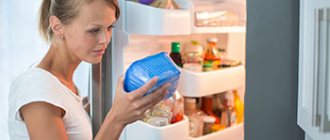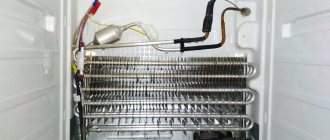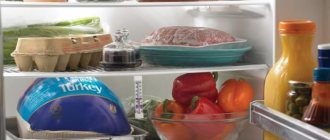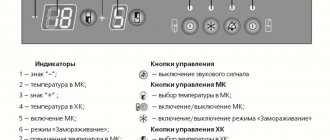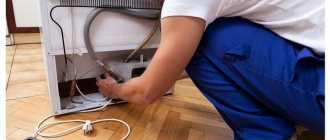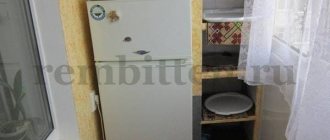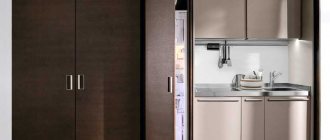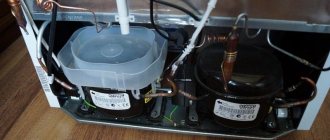During operation, the refrigerator can make a variety of sounds. Many of them are quite normal, which indicates the serviceability of certain systems. Still, there are times when the refrigerator gurgles, and this is no longer normal. The appearance of this sound indicates the presence of a defect, which may become more serious and make repairing the equipment more difficult. Even taking into account that the unit is a complex device, some reasons when it makes bubbling sounds can be identified independently. At the very least, understanding the situation will help the technician most accurately describe the essence of the problem if it is not possible to repair it on your own.
Possible causes of gurgling sounds when the refrigerator is operating
NECESSARILY!
To determine the specific reason why the refrigerator gurgles, you should first familiarize yourself with its structure. The unit consists of a compressor that pumps refrigerants r134a and r12 through the system, which are most often used as a coolant. Due to its low boiling point of -23 degrees, gas is an ideal substance. It compresses and expands well, which ensures the operation of the law of thermodynamics.
Charging the system
In addition to the compressor, the design also contains an evaporator, filter drier, radiators, thermostat, control board and other components. A refrigerant circulates through a closed system, which in its different parts takes on a different state of aggregation. Under normal conditions it is a gas, but when compressed it turns into a liquid. The system also requires oil to protect all components. We list the most likely problems when the refrigerator gurgles and does not freeze:
- Malfunction of the freon circulation system. The refrigerator makes a gurgling sound. The system is leaking freon from the system.
- Malfunction of the compressor, which does not cope with its work. Performs insufficient compression on the workspace.
- A blockage in the pipeline that creates a large pressure difference before and after the blockage.
- A low-quality refrigerant that changes its properties when compressed.
There are quite a few elements in the refrigerator that can make different sounds when operating. In any case, to find a specific breakdown, it is necessary to carry out diagnostics.
Ice
Signs and causes of malfunctions:
- The refrigerator gurgles and does not freeze. The most common reason for this behavior is a freon leak. Instead of freon, oil from the compressor circulates through the tubes.
- The refrigerator gurgles after being turned off. The circulation of freon through the piping system can produce various sounds such as bubbling or bubbling. When the compressor stops, the pressure in the system equalizes and the gurgling may continue for a couple of minutes. Then the sounds will stop. This is normal operation of the refrigerator!
- A refrigerator with a No Frost system makes different sounds and bubbles. A layer of ice appears in the refrigerator, and after complete defrosting, snow ice begins to appear again. Such signs often indicate the presence of malfunctions in the defrost system. The source of the crackling noise in this case is the fan, the blades of which touch the ice. The defrost system may fail: the timer, evaporator heater or sensors.
- The refrigerator is knocking and gurgling. The sound is strongest when the compressor is turned on or off. In this case, the main reason lies in the fact that the shock absorbers on the compressor have become loose or stiff. As a result, during vibrations, the motor comes into contact with the housing and an increased sound appears. When the engine starts or stops, there is a jerking or knocking noise, so the noise begins to intensify. The shock absorber needs to be adjusted or replaced. The compressor itself may also be to blame.
The refrigerator purrs loudly, there are no other complaints about its operation
If the refrigerator makes soft gurgling sounds when operating, then there is no need to worry. Cooling of products in the chambers is carried out precisely due to the circulation of freon through the system. The appearance of a characteristic noise when it rubs against the walls of the tubes is quite normal, unless, of course, the sound becomes too strong. Its appearance is explained by a change in the diameters of the throughput pipes. Accordingly, where there is a narrowing from a larger to a smaller size, the noise intensifies.
Also, refrigerator repairs will not be required when purchasing new equipment. The peculiarity of the new models lies in the type of refrigerant used. Many manufacturers have long switched to R600a. It is a more fluid substance than the common R314a. Accordingly, it will gurgle much louder, which is quite normal.
Fan
IMPORTANT!
Determining what is in the system is quite simple. To do this, you need to look at the passport or the label directly on the compressor. As for the permissible noise level, there is a standardized limit. It constitutes a boundary at 40 dB. If the magnitude of the sounds produced is greater, then you should worry.
One of the reasons why the refrigerator makes strange sounds, gurgles and crackles is a lack of liquid. There is extra space left in the system, which ensures almost unhindered propagation of sound waves. In this case, not only gurgling sounds are felt, but also a knocking sound may occur when the compressor is turned on and off. Such a defect is dangerous and must be eliminated without fail. To do this you will need to do the following:
- Check the pressure in the system. If it is not enough, then most likely there is a refrigerant leak.
- Remove the old filter drier.
- It is necessary to search for the damaged area and drain the fluid from the system.
- Purge the circuit with nitrogen, because there is a large amount of moisture in the compressed air.
- Solder a new filter and fill the system, monitoring the pressure.
In any case, if the refrigerator gurgles, but this has not happened before, this indicates a breakdown or defect. You need to diagnose the problem and find a way to fix it.
Still, is there anything you can do if it’s bubbling very loudly?
Buying a new refrigerator is a pleasant moment, but what should you do if it makes noise when you first turn it on? Absolutely nothing, because the equipment stood in the warehouse for a long time without work. Naturally, all pipes, capillary tubes and pipes are dry and filled with emptiness. Freon is in a volatile gaseous state. The oil, which usually makes the gurgling sounds, is at the very bottom.
Shock absorbers
In order for the refrigerator to return to normal operating mode, it must be allowed to run. The pressure returns to normal and the oil spreads evenly throughout the system. As a rule, after this the equipment works normally, and the level of sounds produced does not exceed 40 dB. If the noise gets worse, the shock absorbers may need to be adjusted. The largest part in terms of volume is the compressor. It contains all the oil in liquid form. During operation, the unit vibrates, which is quite normal. But the knocking noise may increase, indicating mechanical damage to the shock-absorbing elements. In this case, you will have to replace the dampers, to do this you need to perform the following steps:
- Clear access to the compressor.
- Unscrew the screws securing the shock absorbers.
- Replace dampers (rubber ring and spring).
- Screw the screws back.
ATTENTION!
Under normal conditions, the motor should vibrate slightly. Otherwise, the vibration will be transmitted to the body of the equipment and amplified many times over. It is also possible that a similar noise may occur in the Frost refrigerator, which bubbles and makes sounds similar to completely different things. In this case, the problem may be related to a poorly secured fan or other elements that can move due to vibration, creating characteristic sounds.
Can gurgling and gurgling be harmless to equipment?
Refrigerant type
It is important to learn to distinguish between normal and abnormal gurgling conditions of the refrigerator. The fact is that the presence of such sounds is not always safe. Often the refrigerator gurgles after closing the door, which may well be the cause, or rather a consequence, of an upcoming failure.
Let's consider all sorts of situations when this technique can make similar sounds:
- It gurgles and doesn't freeze. In addition to gaseous refrigerant, the system contains oil. If there is no freon, then lubricant will circulate instead of the mixture. It is she who makes the characteristic gurgling sounds. You can also still feel bubbling and dripping. To solve the problem, it is necessary to check the entire system as a whole.
- Gurgles when turned on. Considering that the working environment inside is in a liquid state, gurgling and other sounds inherent in such a substance are quite normal. There should be no reason to worry. The equipment will hum for a while and then calm down. This process can take up to 1 day. Moreover, the sounds remain even after the power is removed from the compressor.
- The refrigerator makes noise when operating. This defect is especially often observed in devices with “No Frost” technology. The noise occurs as a result of the formation of ice, which the impeller clings to. Eliminating the defect involves defrosting, which must be done by the refrigerator itself. And this is the second sign of a breakdown.
It is important to learn to distinguish what exactly is gurgling in the refrigerator. If the shock absorbers are faulty, you can replace them yourself. No specific skills are required to perform this procedure.
What to do
If the refrigeration equipment is making noise but is functioning normally, nothing needs to be done. The noise may disappear on its own over time. If bubbling persists during operation for a long time, you can contact the store to check the serviceability of the device.
If the refrigerator is bubbling but not freezing, you need to check the entire system as a whole:
- If there is a leak in the foamed evaporator, the device assembly is simply cut off from the system, and a new open-type heat exchanger is installed on the back wall of the chamber.
- When freon leaks out through micro-holes in the heating tube located around the perimeter of the freezer, the deformed contour is cut off and the tubes are connected without it. The refrigerator operates without heating the freezer perimeter.
- If freon leaks through a leaky locking connection, it is replaced with a new one.
It is better to entrust noise elimination to a professional.
If the reason for the bubbling of refrigeration equipment is a breakdown, it would be better to contact a specialist. It is not recommended to carry out repair work yourself. If the device is under warranty, the service technicians will repair the refrigerator free of charge.
Subscribe to TechnoCouncil on social networks so you don’t miss anything:
What should I do to find out the reason?
Have you started to feel different strange sounds coming from your running refrigerator? Don't panic, because this technique is prone to noise. Its design contains many devices and functional units that can produce characteristic sounds during operation. These include:
- compressor, it contains the oil necessary to lubricate all steel parts of the system;
- a fan in refrigerators with a “No Frost” system, which can touch ice with the impeller;
- a system of tubes through which freon circulates.
If you find that the refrigerator is gurgling or making other sounds that are not typical for its normal operation, do not be upset. You can find and eliminate some defects yourself. The first of these will be the downtime of the equipment after delivery, until the compressor reaches operating mode.
What to do to reduce the volume of the murmur
If the new unit constantly gurgles and makes noise, the problem cannot be eliminated; isobutane is used as a refrigerant in the system. The devices are tested at the manufacturer for noise levels, this figure does not exceed 50 decibels.
Let's consider other situations:
- You hear the refrigerator purring especially loudly after closing the door. When the flap is open, the compressor automatically turns off and the movement of refrigerant stops. When the door is closed, the system turns on, freon begins to gurgle through the tubes.
- The refrigerator was turned off for a long time, and when plugged in it began to gurgle loudly. It will take time for the equipment to reach constant mode; the sound level decreases after a couple of days.
Actions in case of noise
If gurgling and other sounds do not subside even on the second day, then there is a non-native defect. To do this you need to do the following:
- Check whether the compressor does not hit any pieces of furniture or heating pipes during operation. Always leave free space around the refrigerator for air circulation. Thanks to this, it will not overheat, and its operating efficiency will increase significantly.
- Check to see if ice has formed on the walls. If there is too much of it, then this is a clear sign of a defect. It is necessary to defrost the refrigerator and remove all frozen formations. This should be done carefully with a blunt, non-sharp object.
- It also happens that the refrigerator boils and does not maintain a low temperature, and both the compressor itself and all parts of the system become very hot. This behavior directly indicates clear signs of freon deficiency. To verify this, you need to measure the pressure. To perform this work you will need special equipment. It can be rented for a one-time procedure.
- In new models with a display and a built-in self-diagnosis system, a corresponding “alarm” message appears, which may also be accompanied by a sound signal.
In any case, if you hear noise above 40 dB that does not stop, something needs to be done. It is extremely rare that you can fix a breakdown on your own, so it is better to contact our service center.

